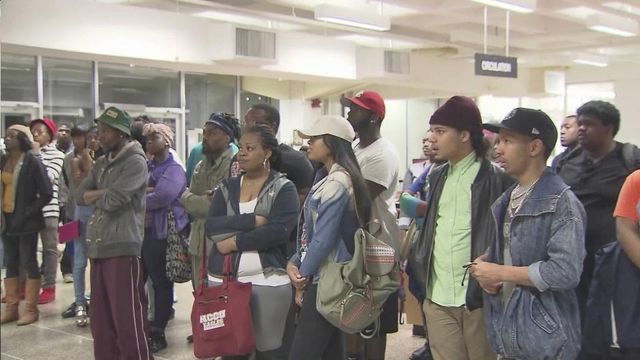NCCU students have subdued reaction to Ferguson decision
For the dozens of students gathered at N.C. Central University Monday night to watch the Ferguson grand jury announcement, they already had a sense of what the decision would be.
Posted — UpdatedWhen it was announced that the grand jury will not indict Ferguson, Mo. police officer Darren Wilson in the shooting death of Michael Brown, their reaction was subdued.
"I don't think any of this was ever set up to bring an indictment," said Jordan Perry, a NCCU junior who watched the announcement in the school’s James E. Shepard Memorial Library. "We can tell just from the delays that have been going on. I think everybody kinda already knew. We were just kinda holding on to a scrap of hope that maybe something positive would happen but I think we already knew.”
Fabiola Doissaint, a NCCU sophomore, didn't agree with the verdict.
"I just feel bad for Ferguson right now," she said. "To me, this seems unrealistic to me. This is crazy right now. Ferguson will not sleep tonight."
The grand jury's decision was announced by St. Louis County Prosecutor Bob McCulloch shortly after 9 p.m. Monday.
"Our only goal was that our investigations would be thorough and complete to give to the grand jury, the (U.S.) Department of Justice and public all the evidence to make a fair decision," McCulloch said.
President Barack Obama, who spoke from The White House following the announcement, said disagreement is expected, no matter the grand jury's decision.
"We are a nation built on the rule of law," he said during a live media briefing. "And so we need to accept that this decision was the grand jury's to make. There are Americans who agree with it and Americans who are deeply disappointed, even angry. It's an understandable reaction."
Obama urged protesters to do so peacefully.
“Let me repeat Michael’s father’s words, hurting others or destroying property is not the answer," he said. "No matter what the grand jury decides, I don’t want my son’s death to be in vain. I want it to lead to incredible change, positive change. Change that makes the St. Louis area better for everyone.”
The anticipation of possible protests led Ferguson school officials to cancel school on Tuesday.
Several vigils and protests are planned across the Triangle and throughout the country on Tuesday. N.C. NAACP President William Barber, who has traveled to Ferguson and met with community leaders there, will share his reaction during a news conference Tuesday morning.
A vigil will be held at Pullen Memorial Baptist Church in Raleigh at 6 p.m. Tuesday.
Ferguson protests made international headlines for weeks following the Aug. 9 confrontation between Wilson and Brown, which inflamed tensions between the city’s majority black residents and majority white police force.
During the initial protests, local law enforcement – dressed in riot gear and carrying militarized weapons and vehicles – were criticized for what some perceived was a heavy-handed response, prompting the Missouri State Highway Patrol to oversee police efforts. The Missouri National Guard were also called in to help quell the riots and violence.
Locally, the Ferguson protests were a reminder of the multiple marches after the death of Jesus Huerta, 17, who died in November 2013 after shooting himself while handcuffed in the back of a Durham police car. The marches resulted in multiple arrests and damage to police cars and a police building.
Hundreds attended peaceful Ferguson protests and marches in Durham and Raleigh in August.
Wilson, the police officer, encountered Brown when he told the teenager and another person walking in the street with him to move out of the roadway, according to Brown’s autopsy report from the St. Louis County Medical Examiner's Office.
“The deceased became belligerent towards Officer Wilson,” the report said. “As Officer Wilson attempted to exit out of his patrol vehicle, the deceased pushed his door shut and began to struggle with Officer Wilson. Officer Wilson had his service weapon drawn, as the deceased began to run towards him, he discharged his service weapon several times.”
Witnesses said Brown, who was shot six times, was killed while his hands were up, or while he was running away.
The claim led to the protest slogan “hands up, don’t shoot,” which was echoed across the country. During an August protest in Durham, attendees raised their arms in the air and held signs that read “don’t shoot.”
Days later in Raleigh, about 70 people chanted “hands up, don’t shoot” and held their arms in the air while marching on the sidewalk from the old Wake County courthouse to the state Supreme Court building.
The shooting also prompted a federal civil rights investigation. U.S. Department of Justice officials said civil rights charges against Wilson are unlikely, according to The Washington Post.
Wilson faced potential charges that ranged from second-degree involuntary manslaughter, punishable by up to four years in prison, to first-degree murder.
• Credits
Copyright 2024 by Capitol Broadcasting Company. All rights reserved. This material may not be published, broadcast, rewritten or redistributed.





